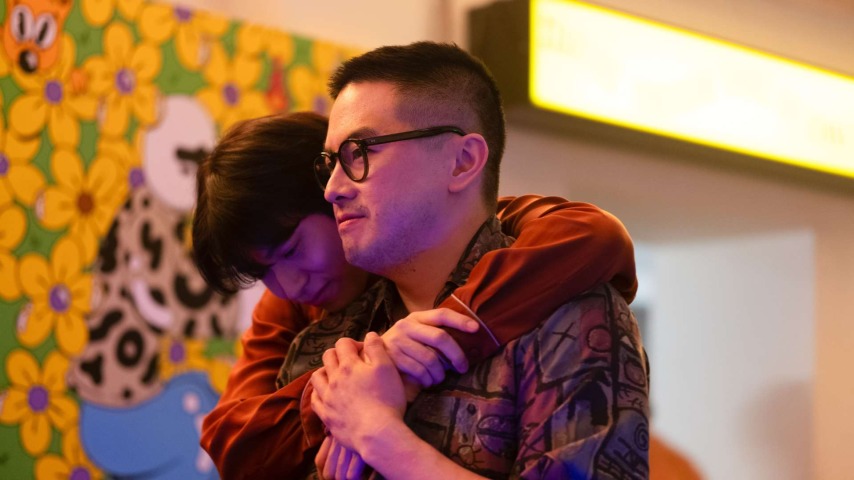The final shot of Ang Lee’s 1993 The Wedding Banquet is a singular indication of a generation’s unprecedented romantic hopes. Wai-Tung Gao (Winston Chao), his boyfriend Simon (Mitchell Lichtenstein), and his sham wife Wei-Wei (May Chin) are arm in arm as they watch Wai-Tung’s parents disappear up an airport walkway. Both the elder Gaos and the younger trio are crying, but Wai-Tung’s parents refuse to look back, barreling forward. The deep reserves of pain and love that these characters share can’t flow freely. Lee’s main characters are both waiting for reciprocation and staring into a future where they can build an alternative family, free of judgment. They are on the precipice of a new century, America’s promising potential overseen by the freshly elected Bill Clinton. It’s an ending curious enough to peer at the unusual shape of what could come next. But it could not have predicted the moment in queer history that would welcome the version of The Wedding Banquet three decades later. The update expands the definition of its central found family to include more players, with even less judgment.
Lee’s bittersweet conclusion sidesteps any trite or cloying assumptions to articulate something painfully true about familial relationships: Peaceful acceptance across generations often feels impossible, and the best-case scenario could be a series of poorly timed truces. The original is a film full of gazing, with a character, or characters, observing a dynamic they can’t quite reach: Simon watching the Gao family shower Wei-Wei with gifts; Wei-Wei and Simon around a hospital corner, listening to Wai-Tung come out to his mother. These moments, though sometimes curdled with tension and pain, capture the urgency of connection. In the end, Simon, Wei-Wei, and Wai-Tung agree to co-raise Wei-Wei and Wai-Tung’s child. They gather in a group hug as Lee moves the camera closer, suggesting the potential of the next generation is near and solid, guided by a willingness to look at the complexity of human desire and build something honest from it.
Andrew Ahn’s updated version of The Wedding Banquet represents that next generation, one who lives in a reality where the conversations around queerness have grown in frequency and, sometimes, complexity. Potential that once simmered beneath moments of communication is replaced by certainty, one that’s at times warm and comfortable with the progress made, and at other points tinged with bitter sorrow at the ideals that were never fully actualized. While Obergefell V. Hodges ensured that gay marriage would be legal across all 50 states in 2015, ensuring that Chris (Bowen Yang) and Min (Han Gi-chan)—the 2025 Simon and Wai-Tung analogues—could marry, recent efforts by an increasingly right-wing Republican party expose the flimsiness of such progressive laws.
When Roe V. Wade was overturned in 2022, Supreme Court Justice Clarence Thomas seized it as an opportunity to publicly question the legitimacy of other progressive rulings. He argued that the justices “should reconsider all of this Court’s substantive due process precedents, including Griswold, Lawrence, and Obergefell.” Thomas’ regressive comments weren’t an anomaly, but representative of a conservative tide that has only continued to swell with ugly rhetoric. In January of 2025, President Donald Trump issued an executive order declaring that the government will only recognize male and female sexes. Just a week later, the Idaho House passed a resolution calling for the Supreme Court to reevaluate Obergefell. Marriage is no longer something to strive for, but a complicated reality, burdened by expectations and judgement. As Lee (Lily Gladstone) explains in the 2025 Wedding Banquet, “love the celebration, hate the institution.”
While Ahn never entirely deals with the heaviness of Trump’s regressive America, his film functioning better as a lighthearted comedy than a drama, the story’s focus on the physicality of belonging, of home and place, is indicative of the state of the country. While Lee’s original focused on the tricky dynamic developing between Wai-Tung, a New York landlord, and Wei-Wei, his tenant-turned-fake-wife, the new version is more interested in the queer found family already binding its protagonists together. Lee’s film traversed New York, while Ahn’s lives largely in the confined space of a shared Seattle home, its dramas and comedies unfolding in the illogical alleys and corners of a real-life house. Ahn’s characters rarely look out at one another like Lee’s, striving to understand. Instead understanding is inherent and embodied—the housemates skirt around each other in a familiar dance, comfortably oblivious. As Angela (Kelly Marie Tran) boils the kettle, Chris (Bowen Yang) fills the birdfeeder and Lee waters her unruly flowers. She teases him by spraying him with the hose; he shrieks in response. It’s a brief glance at their well-earned intimacy, how they bump against one another in domesticity. This is queer life in 2025. Not what could be, but what is.
The vulnerability inherent to families is something Ang Lee has been compelled by in all of his scripts. The Wedding Banquet was one of Ang Lee’s first feature-length scripts, and his second directorial effort following Pushing Hands. When considering Lee’s varied filmography—films often hinging upon restraint and silence—individual frames leap out, all of which thoughtfully articulate ideas of repression and regret. Elinor (Emma Thompson) sitting on the stairs, listening to her family cry behind a series of closed doors in Sense And Sensibility; Mr. Yee (Tony Leung) perched on the edge of Wong’s (Tang Wei) bed, feeling for the indent her body left after sentencing her and her co-conspirators to death in Lust Caution; Alma (Michelle Williams) silently peering at Jack (Jake Gyllenhaal) and Ennis (Heath Ledger) kissing, mouth agape, in Brokeback Mountain.
His Wedding Banquet is laden with similarly meaningful frames, but a late moment between Simon and Mr. Gao (Lung Sihung) offers clarity and reconciliation. After a physical therapy session to assist the elderly man, the two sit perched on a bridge’s concrete edge, sunlight bouncing off of the low waves. Mr. Gao hands Simon a bursting red envelope—a weighty, symbolic gift and proof that he knows of the implicit connection between this man and his son. It’s a short and simple scene, a break from the plot and the complicated family dynamics which have driven it forward, and Mr. Gao renders this context explicit, demanding his son’s partner keep it as “our secret,” separate from the rest of the family. Such heartfelt acceptance lives only in this fleeting moment, as beautiful and brief as the setting sun in the distance.
This kind of unlikely, barely expressible intergenerational connection is carried over by Ahn, who captures the relationship between Chris and his boyfriend’s grandmother (Youn Yuh-jung) in a stilted, tender mid-movie scene. Chris interrupts Grandma Ja-Young flipping absentmindedly through his sketchbook, an emblem of his unrecognized artistic ambitions, the night before his boyfriend’s sham straight wedding. From this unexpectedly vulnerable place, their conversation stumbles along, discussing home and parentage. The conversation peters out with Ja-young acknowledging that tomorrow is a “big day…weird day.” The warm orange lamplight of the courtyard mimics the enveloping of a sunset, the very kind that Simon and Mr. Gao faced in 1993. A burgeoning rapport is still burdened with things that can’t quite be spoken, love that’s real but buried under the weight of lives lived from afar.
Both Ang Lee and Andrew Ahn use these scenes to grapple with how limited language is in expressing deep desires, romantic or otherwise. Neither scene includes a line that pinpoints why the characters are there, or even who they are to each other. No amount of legal or social change can compensate for the limitations of those on the outside of these relationships.
How Lee and Ahn’s Wedding Banquets express their queer intimacy reflects their different moments along the timeline of queer rights. Lee ended on his characters literally embarking on something new. Ahn fades out on the foursome’s home. Both endings involve children, but the new version erases some of the uncertainty. Its lasting image is a familiar one: the house with a white picket fence, stable, normal, secure. In the 30 years between these projects, the hope of meaningful (if destabilizing) progress has been replaced by the hope for reliable routines that keep us rooted in one another’s lives. If one thing remains consistent in this story and its adaptation, it’s that queer love, and the families that love nurtures, pushes forward against ever-shifting political backdrops.









































